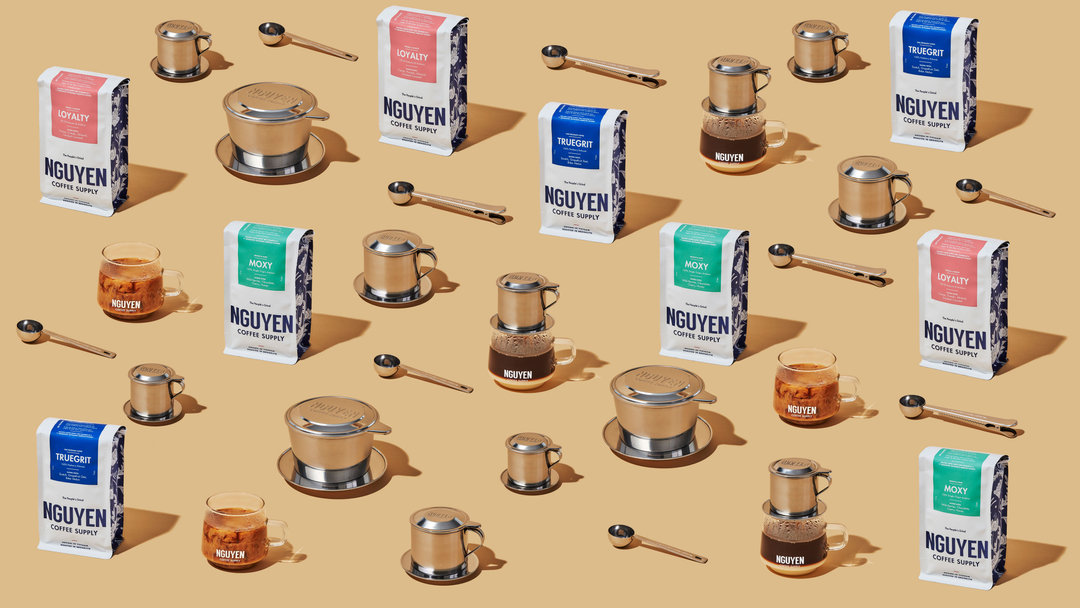Meet the brands shining the spotlight on Vietnamese coffee
Vietnam is the world’s second-largest coffee producer, but it’s not often highlighted by specialty coffee brands. Among the 60 brands selling coffee in the Thingtesting directory, several want to change this.

Nguyen Coffee Supply is a brand championing coffee beans from Vietnam, and which launched in 2018. (Photo: Nguyen Coffee Supply)
COFFEE CULTURE
Vietnam may be the world’s second-largest coffee producer — but in the U.S., it’s not easy to get a specialty cup featuring the country’s coffee.
“Vietnamese coffee was non-existent in U.S. coffee culture,” says Sahra Nguyen, the founder of Nguyen Coffee Supply. “It’s a huge missed opportunity to appreciate this massive global coffee player.”
Since 2018, Nguyen has been importing coffee beans from Vietnam and roasting them in New York. As well as selling bags of coffee online, Nguyen Coffee Supply’s range also includes ready-to-drink cold brew cans plus ‘phins’, the traditional drip filter that’s used in Vietnam. The brand also has more than 50 wholesale partners selling its beans in cafes, restaurants and retail settings.
Vietnamese coffee in America
The U.S. imports plenty of Vietnamese coffee, but instead of being showcased on the labels of bags of coffee, it’s more likely to be consumed as instant coffee or as an ingredient in other products.
But it’s becoming more common to see Vietnamese beans showcased by coffee brands. In 2017, Debbie Wei launched Copper Cow Coffee, a direct-to-consumer brand that sells coffee sourced from Vietnam in a single-use, pour-over format. Last year, Wei raised $8.5 million to expand its distribution footprint across the U.S. Earlier this year, Nam Coffee launched with three different blends showcasing Vietnamese coffee beans. Perhaps inspired by these new kids on the coffee scene, Blue Bottle Coffee launched its first-ever coffee from Vietnam in August.
“Coffee grown in Vietnam, particularly Robusta [beans], has been channeled into the commodity coffee market,” Nguyen explains. “That’s how it’s always been, so maybe folks have relegated Vietnamese coffee to cheap and instant. But industries are created by people, and there is a desire to enter the premium coffee market in Vietnam.”
Ninety-five percent of coffee grown in Vietnam is Robusta, which suffers its own reputation problem — it is considered to be hardser than Arabica, the more popular bean among coffee connoisseurs. But tastes are changing: analysts at trend forecasting agency WGSN are already predicting a ‘post-Arabica’ era for the coffee industry, with Robusta beans in a good position to swipe market share.
Understanding Vietnamese coffee
A challenge for brands championing Vietnamese coffee beans is to get the average American consumer to understand that not only do these beans make a tasty cup, but it doesn’t have to be served with condensed milk as the default.
“That’s a very common perception of Vietnamese coffee — people immediately think of sweetened condensed milk,” says Nguyen. “But when we think about an Ethiopian coffee or a Brazilian coffee, we never think about it in association with a milk.”
Nguyen says that whenever she demonstrates the product in videos, she brews the coffee black and encourages the audience to use whatever milk they prefer — or none at all. When the company released its canned cold brew in August, it chose not to add any milk in order to showcase the profile of the Robusta beans. While Copper Cow Coffee does sell latte bundles, which contain the pour over coffees and sachets of condensed milk creamer, it also sells its coffee pour-overs separately to be drunk black.
“When we started, we were the only ones championing Robusta and I personally faced a lot of resistance from folks in the industry,” says Nguyen. She says her mission with Nguyen Coffee Supply is not only to change U.S. consumers’ perceptions of Vietnamese coffee, but also to encourage the uptake of Robusta coffee beans among specialty brewers — which would in turn open up a new revenue stream for farmers in Vietnam. Nguyen sources the coffee for her brand from a farm in Da Lat, a highland city known for its coffee-growing climate. “We’re not here to say Robusta is better than Arabica, but we want to expand the conversation so consumers can make up their mind.”